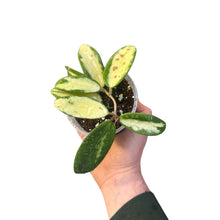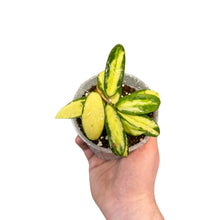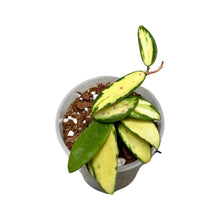There are many synonyms for this plant, for example Hoya sp. Bogor, Hoya pallida, Hoya acuta, and Hoya parasitica.
Hoya verticillata is part of the Apocynaceae family and is widespread from India and Sri Lanka through Thailand, Peninsular Malaysia, Singapore, Sumatra, Philippines and Borneo. In Borneo it is common in coast forest, mangroves and peat swaps. It is a robust terrestrial to epiphytic glabrous climber, reaching up to 20m in its native environment. Leaves are thick and lanceolate, elliptic or ovate and are arranged opposite on very shortly spaced internodes with palmate or pinnate venation but it’s quite hard to see. Leaf margins are green with inner yellow and white variegation. Flower colour varies.
Genus name is new Latin, named after Thomas Hoy ( c. 1750– c. 1821), English gardener. Specific epithet comes from the Latin verticillatus, meaning verticillate, in reference to leaves arranged in fours, although this is very rare.
9cm potted plant in a coco husk plug with coco coir, coco chips, perlite and pine bark. We do not recommend removing the plant from the coco husk plug.
The picture shown is an example of what's in stock. You will receive a plant as close to the picture and description as possible.
Light: Bright indirect light, meaning the plant sees the sun for 0-4 hours per day - this could be through trees or a translucent curtain, it’s important for the plant to see the sky in order to thrive. An east-facing window is usually a good spot.
Water: Allow the majority of the mix to dry out as the mix is traditionally quite chunky, water will usually flow through quite easily. Be sure to thoroughly moisten the substrate.
Potting mix: Our potting mix would be ideal with some added coco chips.
Fertilising: Feed your plant every few waterings during the growing season or when you observe active growth. You can dilute fertiliser to half the recommended amount but never add more.
Temperature: 15-35°C.
Humidity: Average humidity is fine for this plant, but I would recommend 60% and above to get the most out of your plant.
Hoya aren’t considered toxic, however, they may make your pet or child vomit if ingested, keep out of reach just to be safe.





